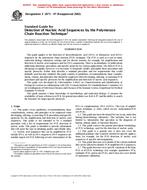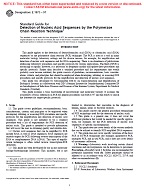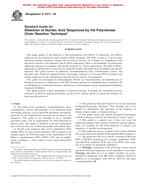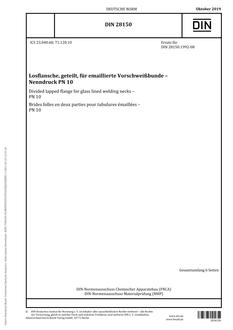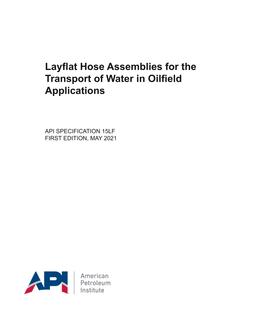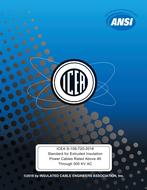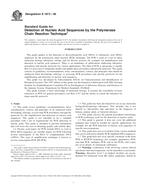
ASTM E1873 PDF
Original price was: $58.00.$35.00Current price is: $35.00.
Standard Guide for Detection of Nucleic Acid Sequences by the Polymerase Chain Reaction Technique (Withdrawn 2014)
| Published by | Publication Date | Number of Pages |
| ASTM | 11/01/2006 | 9 |
ASTM E1873 – Standard Guide for Detection of Nucleic Acid Sequences by the Polymerase Chain Reaction Technique (Withdrawn 2014)
1.1 This guide covers guidelines, recommendations, basic considerations, criteria, and principles to be employed when developing, utilizing, or assessing PCR procedures and specific protocols for the amplification and detection of nucleic acid sequences. This guide is not intended to be a standard procedure with a list of requirements for PCR detection of nucleic acids. This guide is intended to provide information that will assist the user in obtaining quality and reliable data.
1.2 Nucleic acid targets for PCR include DNA, as well as RNA ; RNA sequences are suitable targets for PCR following reverse transcription of the RNA to complementary DNA (cDNA). This type of amplification technique is known as reverse transcription-PCR (RT-PCR).
1.3 This guide has been developed for use in any molecular biology/biotechnology laboratory. This includes, but is not limited to, laboratories that specialize in the diagnosis of human, animal, plant, or bacterial diseases.
1.4 This guide conveys the general procedural terminology of PCR technology used for the detection of nucleic acids.
1.5 This guide is general; it does not cover the additional guidance that would be needed for specific applications, for example, for the PCR detection of nucleic acid sequences of specific microorganisms.
1.6 This guide does not cover details of the various methods that can be utilized to identify PCR-amplified DNA sequences.
1.7 This guide does not cover specific variations of the basic PCR or RT-PCR technology (for example, quantitative PCR, real-time PCR, multiplex PCR, and in situ PCR), and it does not cover details of instrument calibration.
1.8
Product Details
- Published:
- 11/01/2006
- Number of Pages:
- 9
- File Size:
- 1 file , 110 KB
- Redline File Size:
- 2 files , 220 KB
- Note:
- This product is unavailable in Russia, Ukraine, Belarus

